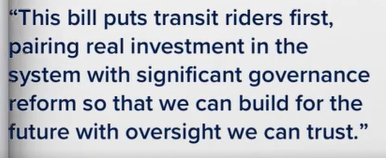This statement from the sponsor pretty much says it all:

From something called ICYMI:
The bulk of the funding, $860 million, would come through redirecting sales tax revenue charged on motor fuel purchases to public transportation operations. Another estimated $200 million would come from interest growing in the Road Fund.
So money paid by motorists will subsidize those fortunate enough to be able to ride mass transit to and from work.
Just like the original Regional transportation law with its
- 5% RTA gas tax
- parking tax
- diversion of money from MFT throughout the state
And it passed the House about 2 AM and the Senate about 4 AM.
The same type of night-time approval as for the SAFE-T Act.
= = = = =
It’s even worse than I discuss above.
Here is the summary from the Chicago Sun-Times:
The new bill, which now heads to Pritzker’s desk for his signature, includes a number of new revenue sources:
- Redirecting the state’s sales tax on motor fuel to transit operations, collecting $860 million a year.
- Dedicating all of the interest on the state’s $8 billion road fund to transit, collecting nearly $200 million a year.
- Authorizing the Regional Transit Authority to increase its Chicago area sales tax by 0.25%.
- No fare increases on public transit for the first year after the bill’s passage.
- Increasing tolls by 45 cents for passenger cars, and 30% for other vehicles, to raise up to $1 billion for the Illinois Tollway.
- A 15-vote threshold on a new 20-member board to replace the Regional Transportation Authority.
- An effective date of June 1, 2026
“…co-sponsor [Eva-Dina] Delgado called the new transit funding mechanisms ‘a way we can avoid raising significant taxes on folks.’”
Like allowing a hike of one quarter of one percent in McHenry County sales taxes will be insignificant.
And from NPR:
“…the measure would be fueled by revenue sources that currently feed the state’s Road Fund and an increased sales tax targeted to the Chicago area.
“The bill frustrated some lawmakers outside the Chicago area because of provisions that reroute money from the broader funding source of infrastructure projects…
“The plan calls for raising the existing Regional Transportation Authority sales tax by 0.25 percentage points, to 1% in Lake, McHenry, Kane, DuPage and Will counties and 1.25% in Cook County. That tax hike will generate $478 million.” [Emphasis added.]
Just as the RTA law did.
And, there’s more pain for drivers:
“Drivers of passenger vehicles on northern Illinois’ toll roads will also have to pay 45 cents more per toll as part of a plan to create a new capital program for tollway projects. It will also increase by inflation each year. That will raise up to $1 billion annually, Marc Poulos, executive director of Local 150, told the House Executive Committee Thursday evening.”
And more subsidies for riders:
“The bill also calls for 25% of the systems’ revenue to come from fares. Historically, half of the funding was generated by the riders, but that requirement became unsustainable after the pandemic.”
Local input:
“Sen. Don DeWitte, R-St. Charles, the Senate Republican’s transit leader, spoke in support of using interest from the road fund to pay for public transportation,” although he voted against the bill.
